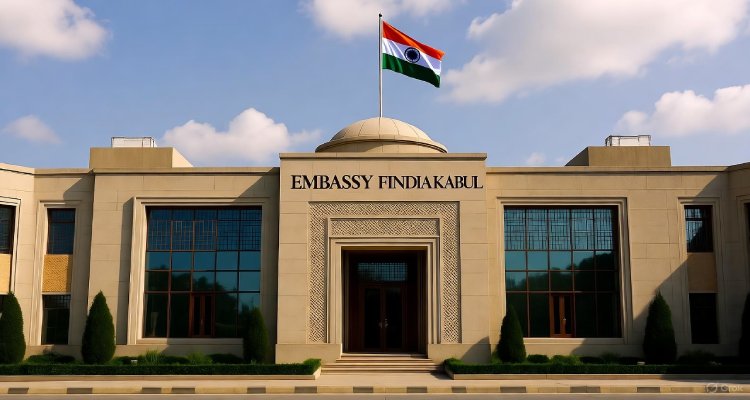India Upgrades Technical Mission in Kabul to Embassy

India restores its diplomatic presence in Afghanistan, upgrading its Technical Mission in Kabul to a full-fledged embassy to reaffirm bilateral engagement and development cooperation.
Introduction: A Strategic Return to Kabul
In a move signaling renewed diplomatic engagement, India has officially upgraded its Technical Mission in Kabul to the Embassy of India in Afghanistan as of October 21, 2025. The restoration marks a significant step in New Delhi’s evolving approach toward Afghanistan—one guided by regional stability, humanitarian responsibility, and cautious re-engagement under complex political realities.
Context & Background: From Withdrawal to Reconnection
India’s presence in Afghanistan has endured decades of geopolitical upheaval, from the post-2001 reconstruction era to the Taliban’s sudden return to power in August 2021. Following the regime change, India evacuated all diplomatic staff, temporarily closing its embassy in Kabul amid security concerns.
Nearly a year later, in June 2022, India cautiously re-established contact through a so-called “technical team” in Kabul. This team was tasked with overseeing humanitarian aid, monitoring projects, and maintaining administrative functions without formal diplomatic recognition.
This gradual return aimed to balance India’s dual objectives: ensuring security for its citizens and continuing its long-standing contributions to Afghanistan’s reconstruction, education, and healthcare sectors.
Main Developments: Restoring Embassy Status
The Ministry of External Affairs (MEA) confirmed that the Technical Mission had been formally upgraded to the Embassy of India. The announcement followed Minister of External Affairs S. Jaishankar’s recent meeting with Afghanistan’s Acting Foreign Minister Amir Khan Muttaqi, where discussions centered on expanding India’s diplomatic footprint and cooperation across humanitarian, developmental, and trade domains.
According to the MEA’s official statement, “the decision underscores India’s resolve to deepen its bilateral engagement with the Afghan side in all spheres of mutual interest.” The embassy’s re-establishment will focus on strengthening India’s humanitarian support, educational scholarships, healthcare cooperation, and infrastructure development—projects that have long defined Indo-Afghan relations.
The move also positions India among the limited number of countries that have re-established formal diplomatic channels in Kabul post-2021, without necessarily granting recognition to the Taliban government.
Expert Insight and Reactions
Policy analysts view this development as a pragmatic recalibration rather than a political endorsement. Dr. Harinder Sekhon, a strategic affairs expert at the Vivekananda International Foundation, noted, “India’s decision reflects a recognition that complete disengagement from Afghanistan would erode its hard-earned goodwill among the Afghan people. Reopening the embassy restores operational flexibility without political recognition of the regime.”
Afghan observers, meanwhile, have welcomed India’s return. Local journalist Abdul Samir Hamdard in Kabul remarked that India’s consistent humanitarian efforts—including wheat and medical supplies—help sustain vital aid at a time when many international donors have withdrawn. “The Indian presence symbolizes continuity and trust,” he said.
Social media reactions among Afghans likewise reflect cautious optimism. Many citizens expressed hope that stronger ties with India would lead to renewed economic opportunities and improved access to education—particularly through Indian scholarships that have historically enabled Afghan students to study at top Indian universities.
Impact & Implications: Reconnecting Through Development
This diplomatic restoration carries both symbolic and functional weight. On one hand, it reinforces India’s image as a steadfast regional partner committed to supporting the Afghan populace. On the other, it opens channels for coordination on pressing issues such as humanitarian aid distribution, regional trade routes, and counterterrorism cooperation.
Economically, the move could revive stalled projects like the Chabahar Port corridor and energy transmission lines, which hold potential to re-integrate Afghanistan into broader South and Central Asian connectivity frameworks.
For the Taliban-led administration, India’s re-engagement offers legitimacy and access to one of the region’s most active development partners. For Afghanistan’s citizens, it signals hope for continued support in essential sectors—from medical aid to institutional training and infrastructure revival.
India, however, remains cautious. Official sources emphasize that the embassy’s reopening does not constitute formal recognition of the Taliban government but is an administrative step to facilitate developmental outreach.
Conclusion: A Delicate Balance of Diplomacy
India’s decision to restore its embassy in Kabul marks more than just the reopening of a building—it represents a calibrated return to a relationship grounded in humanitarian solidarity and regional pragmatism. Balancing security interests, moral responsibility, and strategic engagement will define this next phase of Indo-Afghan relations.
As the region continues to evolve, India’s diplomatic recalibration in Afghanistan underscores a fundamental truth: sustainable peace and development in South Asia require dialogue, presence, and partnership—not isolation.
Disclaimer :This article is based on publicly available information and official statements from the Ministry of External Affairs. It is intended for informational and journalistic purposes only and does not represent any official policy position.










